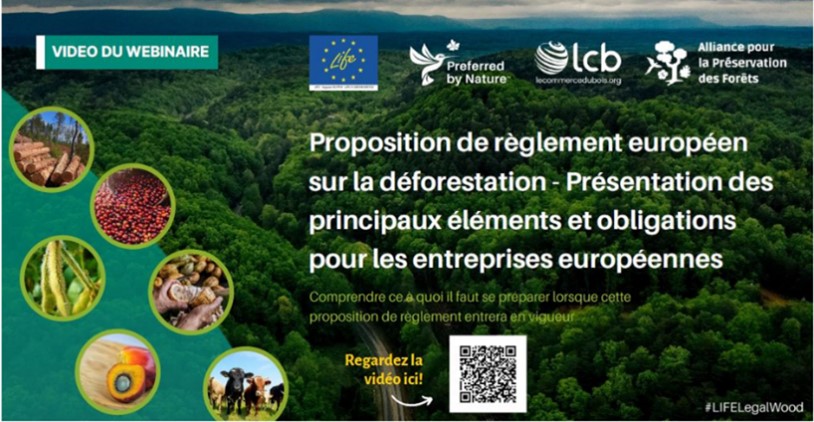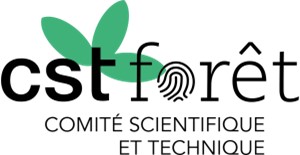

22.04.2022
The ATIBT continues to be involved in the European negotiations on this regulation, particularly on those elements that appear to be of concern, while reiterating its overall support for the Commission's proposal and its objectives.
With the adoption of a new European regulation on wood, soy, coffee, cocoa, beef and palm oil, European companies will soon be faced with new obligations. As such, the ATIBT participated in two events that took place last March: the Preferred by Nature webinar, and the CST Forest workshop organized by CIRAD in collaboration with the French Ministry of Ecological Transition (MTE). To allow you to learn about this draft regulation and identify the risks and opportunities it represents for the tropical timber industry, we propose to review these two events. The ATIBT has also written a FAQ on the draft regulation, do not hesitate to read or reread it.
For the record, the timetable for the adoption of this draft regulation is as follows:

Presentation of the main elements and obligations contained in the proposed regulation during the Preferred By Nature webinar

The French version of this webinar, held on March 18, was moderated by Preferred by Nature's responsible sourcing specialists, Elena Sosa and Chloé Viala, who provided an overview of the key elements and requirements of the proposed regulation to help companies in the relevant sectors prepare for it. Alessandra Negri, LCB's Markets and CSR Manager, also spoke about the French timber industry's experience in implementing due diligence under the EU Wood Regulation and sustainable forest management certification. Finally, Laure d'Astorg, from the Alliance for the Preservation of Forests, presented the self-assessment tool available to companies for the evaluation of their responsible purchasing program.
An English version of this webinar is also available (with other speakers).
Although changes may be incorporated before the final version of the text is adopted, Preferred by Nature wanted to present the key elements contained in the European Commission's proposal. Indeed, the objective of the regulation and the basis of the mechanisms that are proposed will likely remain unchanged. PBN recalled that the EU regulation will establish obligations on the European market to "minimize the consumption of products from supply chains associated with deforestation or forest degradation - and to increase the demand for and trade in legal and zero deforestation products”. This new regulation will therefore replace the EU Timber Regulation (EUTR). The key elements of the project can be summarized in 4 points:
Preferred by Nature also presented the main definitions contained in the EU Commission's text (deforestation, degradation, sustainable harvesting operations), the products concerned and the actors involved. These elements are open to discussion within the framework of the European negotiations in the Council of the EU, as they may appear to be of concern from the point of view of the text's operationality and effectiveness. The ATIBT is also very vigilant to the good cooperation with the producer countries for the construction of this new regulation.
Discussion of the main points of concern of the European regulation at the CST Forest workshop organized by CIRAD

Organized on March 28 within the framework of the CSTF (Scientific and Technical Forest Committee, a body created by AFD and in charge of supporting the implementation of the French National Strategy on Imported Deforestation -SNDI), the workshop brought together some thirty civil society actors identified as key (representatives of the sector, NGOs), experts and researchers, and representatives of the French ministries concerned (Ministries of Ecological Transition, Agriculture and Food). The ATIBT was present to represent the tropical wood sector. The purpose of the workshop was to highlight and discuss the points of concern raised by NGOs, private sector representatives and French delegations, in order to reach a shared understanding of the issues and avenues for compromise.
Five points contained in the EU proposal were discussed:
You can read the full report of the workshop by clicking here (in French).
Among all its recommendations, the ATIBT supported the idea of using the definition contained in Annex 1 of the EU delegated act on taxonomy: "forest means land corresponding to the definition of forest as set out in national legislation or, where this is not available, is in accordance with the FAO definition of forest". Indeed, this definition allows harmonization of EU regulations and avoids the pitfall of imposing a universal definition of forest without taking into account the diversity of forests. To make the definition of forest degradation clear and adapted to the timber sector, the ATIBT supported the idea of linking the definition of degradation to the concept of sustainable forest management.
The ATIBT has also expressed its views on the limits of country risk classification (Benchmarking) and the need to conduct these risk assessments at sub-national levels, or at the operator level to take into account individual good practices (such as sustainable management certification).
Concerning traceability, the ATIBT recalls the experience acquired by the timber sector through the implementation of chain of custody certification and agrees on the importance of a robust and efficient traceability. However, she pointed out that wood processing can combine many sources of these products. A pragmatic solution would be to verify traceability from the first infrastructure of collection or processing (crusher, factory, cooperative ...), and a transparency of all the parcels of supply of it, without having to link a product placed on the European market to a specific parcel.
Through its interventions, the ATIBT has widely highlighted the interest of forest certification to meet the challenges of traceability and sustainability of forest management, and advocates for an unequivocal recognition of this process as a reliable tool for analysis and risk reduction in the future EU regulation.
In addition to this news, the ATIBT is co-publishing a manifesto with E. Groutel (Wale) to recall the historical commitment of the tropical forestry and timber sector to sustainable management and traceability of timber through certification and its experience with due diligence through the application of the EUTR (FLEGT process).
ATIBT will continue to share its position and make proposals for amendments to the text to ensure that the objective of the future regulation is met: "to reduce the consumption of products from supply chains associated with deforestation or forest degradation, and to increase the demand for and trade in legal and "deforestation-free" products in the EU”.
Contacts :
Alessandra Negri, ATIBT Project Manager
Caroline Duhesme, secretary of the ATIBT certification commission